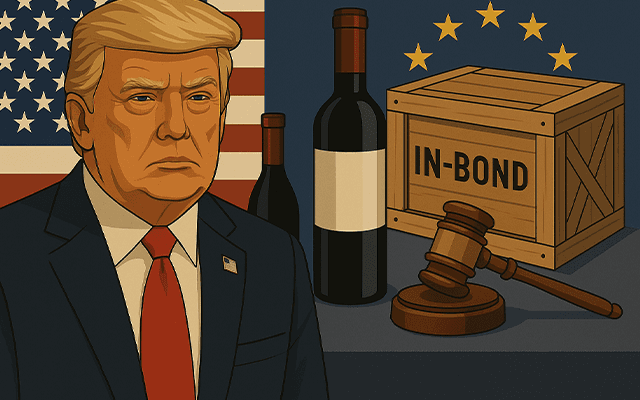TLDR: Trump’s proposed 20% tariff on EU wine imports threatens both European producers and American collectors, potentially costing the EU wine industry €1.6 billion. However, wine collectors can avoid immediate tariff impacts by using “in-bond” storage, which defers duties until wines enter the U.S. market. This approach not only delays tariff payments but also ensures better storage conditions, maintains provenance, and makes secondary market transactions more efficient.
President Donald Trump’s sweeping new tariffs has sent ripples through the global wine industry, raising concerns for both European producers and American collectors. The White House’s sweeping new import tariff plan has left wine industry stakeholders bracing for serious consequences.
A 20% Tariff Shock for EU Wine
Under Trump’s proposed “reciprocal” tariff plan, imports from the European Union will face a 20% levy, with South African goods seeing a 30% levy. Coming just 6 months after France’s agriculture ministry unveiled a plan to uproot 30,000 hectares of vineyards, an escalating and sustained trade war is an existential threat to EU wine producers: the United States is the EU’s single largest export market, worth nearly €4.9 billion in 2024, accounting for 28% of the EU’s total wine export value.
Trade organizations across Europe, including France’s FEVS and the Comité Européen des Enterprises Vins (CEEV), have warned of widespread layoffs, halted investments, and rising consumer prices. A 20% duty on wine could cost the EU industry over €1.6 billion, with approximately €800 million in losses from France alone.
The tariffs don’t just hurt Europe. We have already begun to delay shipments due to uncertainty, and consumers in the U.S. may soon face higher prices for their favorite Bordeaux, Burgundy, Tuscany, and Rioja.
Meanwhile, Canadian retaliation against previous U.S. tariffs has already seen American wine removed from shelves in Canada—previously the largest export destination for U.S. wine exports.
Despite the White House’s claims that these measures will stimulate the domestic economy and promote national security, the global wine trade appears caught in the crossfire of a broader geopolitical battle. We can only hope that cooler heads will prevail, and this tariff spat resolves itself quickly. Unfortunately, it’s too soon to tell what long-term damage has already been done and how long it will take for these self-inflicted wounds to heal.
A Smart Strategy Amid Uncertainty: Store Wine In Bond
While the tariff landscape remains volatile, patient wine collectors and investors are turning to an old-world solution that offers modern benefits: storing wine in bond.
What does “in bond” mean? Simply put, wine stored in a bonded warehouse has not yet cleared customs in its final country of sale. As a result, no import duties, tariffs or taxes—like VAT—have been paid. This opens up several key advantages for collectors looking to mitigate the effects of trade policies.
Deferred Tariffs, Deferred Decisions
One of the most compelling reasons to store wine in bond is the ability to defer tariffs. Since bonded wine hasn’t entered the U.S. market, no duty or tariff is due until the moment it’s withdrawn for consumption. That means collectors can purchase and hold onto wine without immediately incurring the new 20% tariffs—offering the potential to sidestep them entirely if political winds shift.
For long-term investors, this strategy is particularly powerful. Many collectible wines aren’t meant to be consumed for years or even decades. By storing them in bond, collectors can ride out short-term policy swings without locking in unfavorable import costs.
More Than Just Taxes: The Benefits of Bonded Storage
Storing wine in bond isn’t just about tax deferral—it’s also about preserving quality, value, and provenance.
- Professional Storage: Bonded warehouses like Octavian or London City Bond maintain strict climate controls and round-the-clock security to ensure optimal aging conditions.
- Provenance and Authenticity: Because the wine never leaves professional custody, buyers and future investors can trust that it hasn’t been mishandled or exposed to harmful temperature fluctuations. This increases the wine’s resale value and appeal.
- Liquidity on the Secondary Market: Wines sold while still in bond are often more attractive to buyers. The tax liability transfers to the new owner, making transactions smoother and more tax-efficient.
BlockCellar: A Modern Platform for Bonded Wine
At BlockCellar, we combine old-world security with new-world technology. Our tokenized, in-bond wine platform ensures every bottle is authentic, professionally stored, and easily tradeable – without the weight of tariffs or logistical headaches.
Collectors can buy and sell wines without incurring tariff burdens, trade on a secure digital marketplace, and redeem physical bottles when desired. For anyone seeking to protect their portfolio from regulatory uncertainty, bonded storage isn’t just a workaround—it’s an upgrade.
Final Thought
Trump’s proposed tariffs could transform the wine landscape for years to come. But for American collectors and investors, it doesn’t have to mean the end of access to world-class European wines. Storing wine in bond offers a smart, flexible alternative—delaying tariffs, preserving quality, and unlocking new possibilities in a volatile market.
In times of uncertainty, the best investment is often one that gives you options. For wine lovers, that option is in bond.




